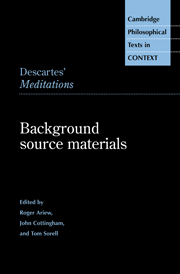Book contents
- Frontmatter
- Contents
- Preface
- Abbreviations
- General Introduction
- 1 Dialectic
- 2 That Nothing Is Known
- 3 The Promotion of Mathematics
- 4 Metaphysical Disputations
- 5 Wisdom
- 6 A Compendium of Philosophy in Four Parts
- 7 Corpus of Philosophy
- 8 The Use of Reason, The Impiety of the Deists, and The Truth of the Sciences
- 9 Unorthodox Essays against the Aristotelians
- 10 The Two Truths and The Immortality of the Soul
- 11 Dialogue on the Diversity of Religions and Little Skeptical Treatise
- 12 Universal Science
- 13 That God Exists
- Appendix: Condemnations of Cartesianism
- Bibliography
- Index
11 - Dialogue on the Diversity of Religions and Little Skeptical Treatise
Published online by Cambridge University Press: 05 June 2012
- Frontmatter
- Contents
- Preface
- Abbreviations
- General Introduction
- 1 Dialectic
- 2 That Nothing Is Known
- 3 The Promotion of Mathematics
- 4 Metaphysical Disputations
- 5 Wisdom
- 6 A Compendium of Philosophy in Four Parts
- 7 Corpus of Philosophy
- 8 The Use of Reason, The Impiety of the Deists, and The Truth of the Sciences
- 9 Unorthodox Essays against the Aristotelians
- 10 The Two Truths and The Immortality of the Soul
- 11 Dialogue on the Diversity of Religions and Little Skeptical Treatise
- 12 Universal Science
- 13 That God Exists
- Appendix: Condemnations of Cartesianism
- Bibliography
- Index
Summary
Introduction
François de la Mothe le Vayer (1588–1672) trained and practiced as a lawyer in Paris, and belonged to the circle of writers called libertins – freethinkers, known for their insistence on relativism and their hostility to the use of any power, religious or secular, for controlling conscience. Gassendi and Hobbes were both well acquainted with la Mothe le Vayer.
The Dialogue on the Diversity of Religions is one of the essays la Mothe le Vayer published under the pseudonym Tubero Orasius in 1630 and reissued with additions in 1631. The Dialogues faits à l'imitation des anciens, as the whole series was called, contains much material that, for its time, is shocking, either because it is blasphemous or because it is sexually risqué. It is sometimes thought that the Dialogues was the “wicked book” that Mersenne and Descartes corresponded about when Descartes, relatively newly arrived in Holland, first began to write about metaphysics in 1630. The dialogue excerpted here is relatively tame. Its theme is that, of the main schools of philosophy, Skepticism is the most compatible with Christianity, despite its method of displaying the uncertainty of received opinion. What is more, Skepticism is best placed to accommodate the diversity of religious belief and observance that is revealed when ancient (i.e., ancient Greek) and modern (i.e., seventeenth-century) Europeans are compared, or when modern Europeans are considered together with their heathen contemporaries in New France. The excerpts have a clear bearing on Descartes' preoccupations both in 1630 and at the time of the Meditations. Orasius considers whether divinity is a demonstrative science.
- Type
- Chapter
- Information
- Descartes' MeditationsBackground Source Materials, pp. 201 - 218Publisher: Cambridge University PressPrint publication year: 1998



